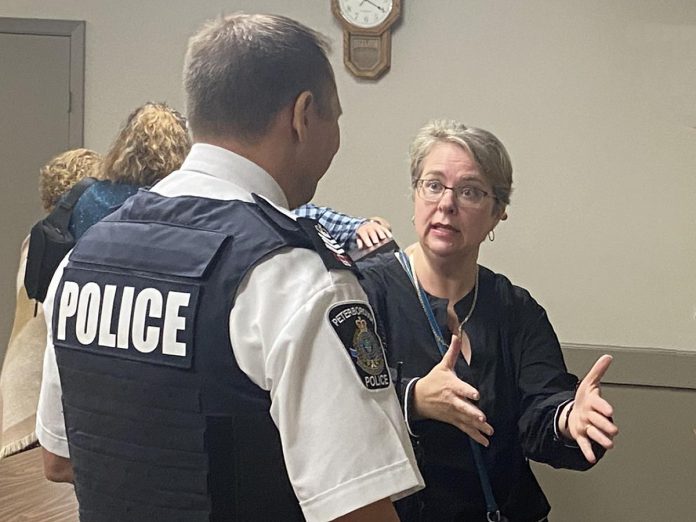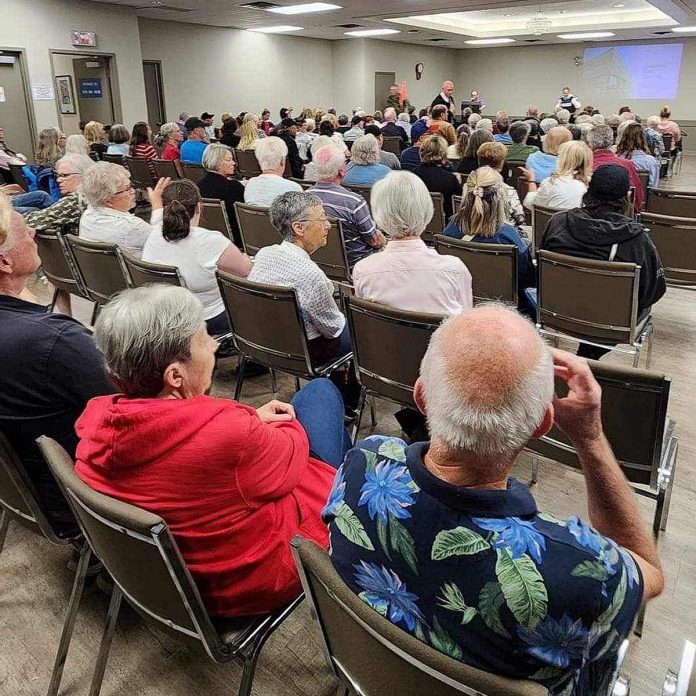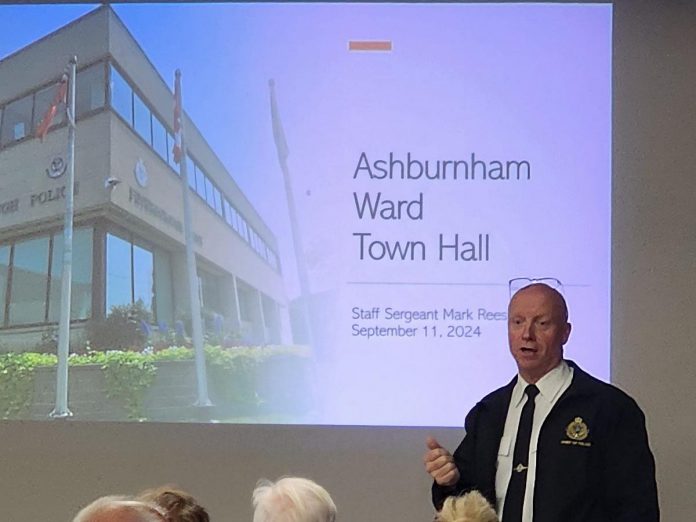
If anything was abundantly clear Wednesday night (September 11) at the Peterborough Lions Community Centre in East City, it’s that the city that earlier generations called home is long gone and there’s no chance of a comeback.
Manufacturing giants are long departed, infrastructure is straining under increased traffic, and barely a week passes without word that a long-established business is either closing or relocating. Then there’s crime.
But as the audience of some 120 people gathered at the Burnham Street meeting place were well aware, it’s the types of crime that is causing the most concern. Residential and vehicle break-ins are all too common, making all, regardless of where they live, more susceptible to being a victim.
On this night, crime and police enforcement in Area 4 — a police-designated sector that encompasses Ashburnham Ward as well as south Peterborough west to past Monaghan Road — was the focus during a community meeting called for by resident Kelly King and subsequently organized by Ashburnham Ward councillors Keith Riel and Gary Baldwin.
Peterborough Police Service Staff Sergeant Mark Reesor was the keynote speaker, but Chief Stuart Betts made a surprise appearance.
After providing a lengthy review of the organizational structure of the city police service, which is comprised of 148 deployable officers and 80 civilian staff, Staff Sgt. Reesor revealed that occurrences of violent crime in the city, as measured by the national Crime Severity Index, have dropped by one per cent since 2022.
Further, also since 2022, there has been a reduction of more than seven per cent in non-violent crimes. Combined, Peterborough has seen drop of just more five per cent, ranking 21st out of 45 Ontario municipalities, with one being the worst ranking.
Not surprisingly, that revelation came as a surprise to most on hand.
“We would love to see those numbers drop more,” said Staff Sgt. Reesor. “But the fact they’re going down, and trending down, doesn’t mean that the work is done — but it’s certainly trending in the right direction.”

Despite that overall decrease, city police are responding to significantly more calls.
From January 1 to the end of August, officers responded to 26,699 occurrences, which is a sizable jump of 10 per cent over the same period in 2023. However, just 16.5 per cent of those occurrences — 4,415 — were “criminal in nature.”
During the same period, 3,079 criminal charges were laid, a 33 per cent increase over the same time frame in 2023. Broken down further, charges laid for theft under $5,000 are up 61 per cent this year, followed by failure to comply with probation (up 53 per cent), and possession of property obtained by crime (up 39 per cent).
According to Staff Sgt. Reesor, most of the calls that police are responding to aren’t related to crime at all.
“What are they? They are a whole bunch of different things. It could be a neighbour dispute, which isn’t criminal. It could be an unwanted person. It could be a motor vehicle accident. It could be somebody asking for information or advice. There’s a ton of different types of calls that we respond to.”
“When somebody calls and says ‘I need help,’ we go because often there’s nobody else to go. It may not be our primary job or role, but when somebody calls and asks for help they expect somebody to show up. That’s us because no one else is often responding.”
Meanwhile, referring specifically to Area 4, Staff Sgt. Reesor noted officers have responded to 6,045 occurrences this year, again to the end of August — a 12 per cent jump over the same period last year. Close to 20 per cent of those occurrences — 1,197 — resulted in criminal charges being laid.
“There’s a real mix in this area of town,” said Staff Sgt. Reesor. “We’ve got schools. We’ve got businesses. We’ve got residential, and we’ve got industrial. It just creates a lot of different dynamics. That’s not unique to this area, but it certainly plays into how we respond to calls and what takes up a lot of our time.”
The good news, noted Staff Sgt. Reesor, can be found in the early success of the police service’s Community F.I.R.S.T. (Community-Focused Investigation Response Support Team) unit. Launched in January as a year-long pilot program and comprised of four frontline officers, its sole responsibility is to investigate property crimes involving both residences and businesses.
This year has seen Community F.I.R.S.T. respond to 1,149 calls and recover $31,414.80 in stolen property as well as 112 shopping carts, more than 20 bicycles, and a handful of green organic waste bins.
“Community F.I.R.S.T. is dealing with what would be triaged as low priority (crime), meaning there not an immediate safety risk,” Staff Sgt. Reesor noted. “Thefts are typically in this category.”
“If somebody breaks into your car overnight and steals a bunch of stuff, it’s important to us, but we may not have an officer available at that time to send right away because of our call volumes. This unit follows up on those types of calls.”

Staff Sgt. Reesor also spoke at length on the service’s Safer Public Spaces initiative. When it was launched in October 2023, it made Peterborough one of just two Canadian police jurisdictions that has adopted a zero-tolerance approach to the use of illicit drugs in public.
Staff Sgt. Reesor drew the meeting’s loudest reaction when he noted Chief Betts has directed “our primary function as a police service is public safety.”
That said, officers encountering someone using an illicit substance in public is first asked to go the Consumption and Treatment Site at 220 Simcoe Street in downtown Peterborough, where he or she can do so legally while begin medically supervised. As a result, of the 395 calls responded to under the program, only 13 arrests have been made, and those for non-drug related reasons.
“When the public doesn’t feel safe, that’s a problem,” acknowledged Staff Sgt. Reesor. “You should have the right to be safe and feel safe. That’s specifically what this program is geared towards. When we get a call about somebody using drugs in an open public space, we will respond and we will deal with that person.”
“That doesn’t mean we’re going to show up and arrest the person, but we’re going to speak with that person and let them know that that behaviour is not appropriate — that we’re not going to tolerate it. Then we’re going to direct them to services that are available in the community. The idea of just pushing them down the road isn’t effective.”
Staff Sgt. Reesor said 78 of the 395 calls for open air drug use were in Area 4. And of the total, 361 calls were resident-initiated.
“That’s good,” he pointed out. “We don’t have the resources to be everywhere. There’s a lot of people in this room, and in Peterborough, that see things. We want to know what’s going on so we can deal with it.”
Finally, Staff Sgt Reesor addressed what is perhaps the most contentious issue for many city residents: tenting.
“If it happens on city property, city bylaw enforcement is the primary responding agency, not the police,” he clarified. “If they require our assistance, they’ll call us and we’ll go and assist them. But our primary purpose, our mandate, isn’t to be dragging people in tents off of public property. Same with bus shelters.”
Somewhat surprisingly, when questions were opened up to the audience, there was little concrete criticism — contrary to what you might see on social media — of city police’s performance. However, there were requests for clarifications about police procedures and initiatives outlined earlier by Staff Sgt. Reesor.
After the meeting, he told kawarthaNOW that the meeting turnout alone provided encouragement for a police service that is tasked to do more with less due to budget restraints.
“When people don’t show up, it means they’ve stopped caring,” Staff Sgt. Reesor explained. “So to see this many people is great. It shows us that people still care. People want to see our community get better.”
He added that the changing make-up of communities across the province, Peterborough included, is a fact of life that is a factor in the occurrences of certain types of crime and how police services adapt to meet the challenges presented.
“I grew up in Peterborough — I remember when it was different than it is now,” Staff Sgt. Reesor said. “Maybe (we) were a little bit more ignorant to the things that were going on back then, but we have seen a shift in this community. It is disappointing and sad to see that shift. I think that certainly spurred a lot of the people to come tonight.”
Although he did not specifically address it when speaking from the podium, Staff Sgt. Reesor implied that crime prevention begins with the exercising of common sense.
“We can only be so many places at a time,” he said of the police. “A couple of the programs I talked about tonight are geared toward providing people with information about how they can reduce the risk of crime at their residence or business.”
“Absolutely people need to take steps in order to reduce the risk of crime. There’s a place for police — our presence and other things play into efforts to reduce overall crime — but we can’t be everywhere, so it is partly on individuals and businesses as well.”

























